Class. Films reviewed: The Old Oak, Monkey Man, Wicked Little Letters
Hi, this is Daniel Garber at the Movies for culturalmining.com and CIUT 89.5 FM.
Ordinary people fighting back is an old story, but not a tired one. This week I’m looking at three new movies — one from northern England, one from southern England, and one from India — about people confronting injustice. There are women fighting the courts, a poor man fighting the oligarchs, and a lonely man trying to stop his town’s gradual collapse.
 The Old Oak
The Old Oak
Dir: Ken Loach (my interview: 2020)
It’s 2016 in a seaside village in northern England. TJ Ballantyne (Dave Turner) is the publican of The Old Oak, one of the few gathering places left standing. But like the town — once a thriving coal pit, but now impoverished and depressed — the pub is not what it used to be. It has few customers aside from a few regulars. The sign is sagging, and half of the building is no longer used. TJ lives above the pub; he’s lonely and pessimistic. His son won’t speak to him, and he has only a little dog to keep him company. But when a group of Syrian refugees arrives in town, TJ decides to help. Alongside Laura (Claire Rodgerson) he distributes furniture and food — donated through local churches and unions — to the newcomers. They are grateful, but some people resent it. Why are they helping refugees when local kids are going without food and heating? Syrian kids are bullied in schools, and a young photographer Yara (Ebla Mari)’s camera is broken.
What can they do to bring the community together? Together with Yara, Laura, and dozens of volunteers, they reopen a long boarded up section of the Old Oak to provide a place where people can come to eat and spend time together. The photographs on the walls recall the coal miners strike of Thatcher’s England: If you eat together, you stick together, says one sign. But can they overcome old prejudices to form new friendships? Or will it all fall apart?
Laura, and dozens of volunteers, they reopen a long boarded up section of the Old Oak to provide a place where people can come to eat and spend time together. The photographs on the walls recall the coal miners strike of Thatcher’s England: If you eat together, you stick together, says one sign. But can they overcome old prejudices to form new friendships? Or will it all fall apart?
The Old Oak is a wonderfully poignant and deeply-moving drama that deals with big issues but on a personal scale. It looks at racism, poverty, unions and scabs, and how geopolitics affect us all. Like all of Ken Loach’s movies, it looks at imperfect people from multiple viewpoints. Some you like and end up hating, others seem like villains but you find out later they’re good people. Lots of grey, no black and white (aside from the photographs Yara takes.)
Once again, the script is by Loach’s longtime collaborator Paul Laverty, and the ensemble cast includes both professionals and first-time actors, many hired at the location.
It shows the real Britain, warts and all, not the shiny tourist-attraction you see in Hollywood movies. It’s a tear jerker, with more than one heartbreaking scenes. But it still leaves room for hope. The Old Oak may be Ken Loach’s final film, so you should get out and see it. I really like this film.
 Monkey Man
Monkey Man
Co-Wri/Dir: Dev Patel
Kid (Dev Patel) is a man with a vengeance — to punish those whose crimes he witnessed as a small child. Raised by his mother in a forest in rural India, he now lives in an unnamed megalopolis in the mythical state of Yatana (= torment, anguish). It is ruled by a god-king followed by throngs of devoted cult-like followers. They kick farmers off their land for corporate profit and persecute minorities with impunity. Kid earns his money as a boxer, beaten up regularly by bigger, stronger men. In the ring, he conceals his face behind a monkey mask, in honour of the god Hanuman whose story his mother had told him as a child. Following a complex scheme, he somehow manages to get work inside an exclusive nightclub ruled by a woman named Queenie (Ashwini Kalsekar). She warns him to never disobey her or step out of his class. He gradually works his way up the latter until he makes it into the kitchen. His goal? To shoot a corrupt police chief named Rana Singh (Sikandar Kher). But his plans all fail, and he ends up a nearly-dead fugitive, his body floating in a canal. He is rescued and brought back to health by a temple dedicated to Shiva, and run by androgynous priests.
They admire that he, an outcaste, dares to fight authority. But he needs the strength and skill if he wants to succeed. So, to the sounds of a tabla drum, he trains in the temple, gradually building up his stamina and muscles until he its ready to face his enemies to the death once again. But does he even have a chance against the powers that be?
ready to face his enemies to the death once again. But does he even have a chance against the powers that be?
Monkey Man is a class-struggle action-thriller about one man’s quest for personal vengeance and his plan to overthrow by force corrupt and autocratic leaders. It’s told using intricate plotting, involving dozens of people cooperating for a single goal. And it interweaves visions and sounds, like a child’s picture book, an elaborate mural, and the thumping of a tabla music. There’s a lot of content to digest. The problem is, a large part of the movie consists of chases and violent fights, and they’re not very good. Blurred shots using a jiggly, hand-held camera may be artistic, but they’re unpleasant and hard to look at. Seasickness is not a valid substitute for good fight choreography.
I admire Dev Patel’s first attempt as a director and his transformation into an action hero, but Monkey Man doesn’t cut it.
 Wicked Little Letters
Wicked Little Letters
Dir: Thea Sharrock
It’s the 1920s in Littlehampton, Sussex, a small town in southern England. Edith Swan (Olivia Colman) is a middle aged educated woman who still lives with her strict parents in a tiny row house. She reads the bible and quotes its teachings; basically, she’s an uptight prig. She shares a wall with Rose (Jessie Buckley) a migrant from the Emerald Isle. She is fond of drinking and carousing, can swear a blue streak, and is often seen wandering in just a slip outside her home. Rose likes her live-in boyfriend Bill (her husband died in WWI) but most of all, adores her daughter Nancy (Elisha Weir). But her neighbour, Edith’s father Edward Swan (Timothy Spall) despises Rose and her libertine ways, and blames her for everything going wrong in Littlehampton. They live in a tenuous detente, until everything changes when Edith receives a piece of hate mail. The unsigned letter is filled with cruel insults and vulgar words.
And when the letters pile up, the police come to investigate. They arrest Rose for the nasty letters and throw her in jail, despite her protests of innocence. The press picks up the story and it becomes a national scandal. But not everyone believes Rose is guilty. A small group of women, led by Police Officer Gladys Moss (Anjana Vasan), think Rose is innocent and set out to prove it. But can they find the true culprit before the trial? And what will happen to Nancy if her  mother ends up behind bars?
mother ends up behind bars?
Wicked Little Letters is a delightful dark comedy, based on a true story; apparently this was a hot topic 100 years ago. Little is the key word: little letters, Littlehampton, and the kind of petty quarrels that can blow up into serious events. This is a movie that knows it’s own boundaries and sticks to them perfectly, without veering off into remote tangents, flashbacks or lengthy soliloquies. It’s tight, set in tiny homes around town, and in the courthouse and jail. The acting is wonderful — everyone’s a character. Olivia Colman and Jesse Buckley previously co-starred in The Lost Daughter, but I like this one much better. And though it’s a period drama set in 1920s England, it uses colourblind casting, with many roles played by black and brown actors, without racial or ethnic issues ever entering the story (except, of course, Rose being Irish in England).
If you’re looking for a fun night out, I think you’ll like this one.
Wicked Little Letters, Monkey Man and The Old Oak all open this weekend in Toronto: check your local listings.
This is Daniel Garber at the Movies, each Saturday morning, on CIUT 89.5 FM and on my website culturalmining.com.
Road movies. Io Capitano, Ordinary Angels, Drive Away Dolls
Hi, this is Daniel Garber at the Movies for culturalmining.com and CIUT 89.5 FM.
The road from the festival circuit to your local cinema is a slow and tortuous one. I reviewed Meredith Hana-Brown’s Seagrass — a moving drama about a young couple and their daughters at an island retreat in BC — five months ago, but it’s finally hitting theatres this weekend — check it out! (Review here).
So, in recognition of that long and twisted path, this week I’m looking at three new road movies. There’s two lesbians in their twenties driving south from Philly, two teenaged boys travelling across the Sahara desert from Dakar, and a middle-aged hairdresser trying to get a little girl to a far-off hospital in time for a transplant.
 Io Capitano
Io Capitano
Co-Wri/Dir: Matteo Garrone
It’s present-day in Dakar, Senegal. Seydou (Seydou Sarr) is a 16-year-old student who works part time as a builder. With his best friend Moussa (Moustapha Fall) they’re saving money for a major purchase. Their goal? To travel to Europe to make it big as singer-songwriters. But though Seydou’s mother and others object — People die at sea! Europe is not like what they show on TV — the two boys sneak out one night, and head off on their journey. They buy their tickets for a long trip across the Sahara, via Mali and Niger to Tripoli, Libya, and from their on to Europe. They are promised modern new trucks to whiz them there. But they soon discover, the world is full of thieves, swindlers, and worse. They are forced to pay bribes to cross borders. Anyone who falls out of the rusty flatbed trucks is left behind to die. They are set upon by cruel bandits, separating the boys, with Seydou sent to a prison run by the Libyan Mafia. Inmates are subject to extortion and torture. And those who survive are sold into de facto slavery. But, somehow, Seydou makes it to Tripoli. Now he has to find Moussa, and get a boat to take them to Italy. But what will the future bring?
Io Capitano is a powerful, heartfelt drama about two young  migrants trying to reach Europe. Seydou is a heroic figure who gradually matures from boy to man to leader. (The title means I am the Captain.) Garrone, as in most of his films (Reviews: Dogman, Reality, Gomorrah), again casts first-time actors in the main roles, giving the movie a hyper-realistic feel. Seydou, for one, is amazing, totally believable. And lest you think this is a gruelling journey, it is also filled with music, dance and magical fantasies that appear in Seydou’s mind.
migrants trying to reach Europe. Seydou is a heroic figure who gradually matures from boy to man to leader. (The title means I am the Captain.) Garrone, as in most of his films (Reviews: Dogman, Reality, Gomorrah), again casts first-time actors in the main roles, giving the movie a hyper-realistic feel. Seydou, for one, is amazing, totally believable. And lest you think this is a gruelling journey, it is also filled with music, dance and magical fantasies that appear in Seydou’s mind.
Io Capitano is an uplifting and heroic story.
 Ordinary Angels
Ordinary Angels
Co-Wri/Dir: Jon Gunn (Writer/Producer: I Still Believe, American Underdog, Jesus Revolution)
It’s the 1990s in Louisville, Kentucky. Sharon (Hilary Swank) is a hair stylist who owns a beauty parlour. She’s known for her sparkling skirts, fringed leather jackets, and her long, curly hair with frosted tips. She likes getting drunk at roadhouses and dancing on the bar. But her best friend and coworker Rose (Tamala Jones), sees trouble ahead if she doesn’t stop drinking. Clearly, Sharon needs something — a lover, a religion, or a cause — to devote herself to. But her first marriage was a bomb (her adult son won’t even talk with her), and going to church isn’t her thing. But when she spots a local newspaper headline — Man’s wife dies, his 5-year-old daughter is suffering from a rare illness — she decides to do something about it. She starts raising funds at the hair salon, and spreading awareness of this family’s plight. Ed Schmitt (Alan Ritchson) is a simple roofer in debt half a million bucks, and his daughter Michelle (Emily Mitchell) needs expensive treatment. Sharon starts giving him envelopes of cash she raises, but he doesn’t feel comfortable. Why is this strange alcoholic woman giving him money?
But the kids and Ed’s mom take to Sharon like bees to honey.  She helps him balance his books, and raises money from the bigwigs in Louisville. Soon everyone knows about Michelle’s plight. But when the big day comes for a liver transplant, the city is closed down by a freak snowstorm. And the hospital is halfway across the country. Are Sharon — and the community’s — wits and determination be enough to save a dying girl?
She helps him balance his books, and raises money from the bigwigs in Louisville. Soon everyone knows about Michelle’s plight. But when the big day comes for a liver transplant, the city is closed down by a freak snowstorm. And the hospital is halfway across the country. Are Sharon — and the community’s — wits and determination be enough to save a dying girl?
Ordinary Angels is an uplifting, non-preachy faith-based drama about an ordinary woman trying to change the world. It feels a bit manipulative at times, with gushing music, and twinkling stars overhead . Ed barely talks — he’s the strong, silent type, just yes ma’am, no ma’am — and little dying Michelle is way too cute. Luckily, Hilary Swank is just great as the indefatigable Sharon, a woman who won’t take “no” for an answer. Yeah, the movie is a little bit forced and a little too long, but it also tugs your heart-strings in just the right places. And it’s great seeing a large group of people working together in an attempt to save a life. (It’s based on a true story.)
So if you like tear-jerkers, this one is a two-hankie classic, one that’ll leave you crying, for sure.
 Drive Away Dolls
Drive Away Dolls
Co-Wri/Dir: Ethan Coen
It’s 1999 in Philadelphia.
Jamie and Marion are best friends, but couldn’t be more different. Jamie (Margaret Qualley) has a southern drawl and a wild-at-heart attitude. She’s always up for a roll in the hay with any chick she meets in a lesbian bar. Marian (Geraldine Vishvanathan) is reserved and uptight, stuck in a futureless, cubicle office job. But when Jamie’s long-time girlfriend Sukie (Beanie Feldstein) catches her cheating in their own apartment, she goes ballistic. Sukie is a hot-headed cop and Jamie knows when it’s time to skedaddle. So she decides to go for a drive home to Tallahassee with Marian as her co-pilot. Luckily, Jamie knows about a great deal at Drive Away autos — they deliver the car to Tallahassee and they get the ride for free. What they don’t know, is they’re driving the wrong car, carrying unexpected cargo in the trunk: a metal suitcase… and a human head!
You see, that metal suitcase contains something of crucial importance to someone with a lot of power, and a gang of ruthless men want it back. And they’re racing down the highway trying to catch up with  Jamie and Marion and take back the suitcase. But the clueless pair are taking their own sweet time, with Jamie smoking pot and meeting up with nubile soccer players in honky-tonk bars and sleazy motel rooms on the way, while Marion has to deal with over-zealous redneck sheriffs. But the criminals are steadily getting closer, and who knows what will happen if they meet. What’s in the metal suitcase? Can Jamie and Marion stay friends? And is there something deeper going on between them?
Jamie and Marion and take back the suitcase. But the clueless pair are taking their own sweet time, with Jamie smoking pot and meeting up with nubile soccer players in honky-tonk bars and sleazy motel rooms on the way, while Marion has to deal with over-zealous redneck sheriffs. But the criminals are steadily getting closer, and who knows what will happen if they meet. What’s in the metal suitcase? Can Jamie and Marion stay friends? And is there something deeper going on between them?
Drive Away Dolls is an unapologetic B-movie, a non-stop comedy-thriller about lesbians on the road. It’s full of wanton sex and gratuitous violence, though nothing overly explicit. It also features cameos by A-listers like Matt Damon, Pedro Pascal and Colman Domingo. And it’s all strangely interspersed with vintage, psychedelic soft-core hippy-porn, (its meaning only revealed at the end). This is like a Coen Brothers movie, but no Joel. Instead Ethan is paired with longtime film-editor (and wife) Tricia Cooke who also co-directed and cowrote it, apparently based on her own salad days. It’s great raunchy fun. The only thing that puzzles me is, in a movie that’s all about lesbians, why does the trailers completely hide that fact? (Not to mention changing the title from Drive Away Dykes to Drive Away Dolls.) But I guess you have to sell a movie to a broader audience or you won’t get the crowds.
Either way, I really enjoyed this one.
Io Capitano is now playing at the TIFF Lightbox; with Drive Away Dolls and Ordinary Angels both opening theatrically this weekend in Toronto; check your local listings.
This is Daniel Garber at the Movies, each Saturday morning, on CIUT 89.5 FM and on my website culturalmining.com.
Films reviewed: Orlando: My Political Biography, Fallen Leaves
Hi, this is Daniel Garber at the Movies for culturalmining.com and CIUT 89.5 FM.
Toronto’s Fall film festival season continues in December with the Jayu Human Rights film festival showing insightful documentaries on pertinent issues, along with a slam poetry competition at the Ace Hotel.
But this week, I’m looking at two new European movies that played at TIFF this year and are now in cinemas. There are trans shape-shifters in France and lonely job-seekers in Finland.
 Orlando: My Political Biography
Orlando: My Political Biography
Wri/Dir: Paul B. Preciado
It’s 17th century, Elizabethan England. Orlando is a teenaged boy, a handsome courtier in the Queen’s castle. He’s also an aspiring writer, waxing lyrical on oak trees and winter frosts. He falls in love with Sasha, a blonde, Russian aristocrat. But at the age of 30, he wakes from a deep sleep transformed into a woman. Orlando’s life takes her (and him) through various guises over hundreds of years, to capitals as far away as Constantinople, until finally returning by ship to 20th century London, where they finally complete and publish their book. Such is the “biography” of Orlando in Virginia Woolf’s famous novel. So what’s different about this film?
For one thing, the entire cast is trans or non-binary, as is Preciado, the director. And the cast is huge. Each version of Orlando is played by another actor, their sex, gender and sexuality presented in a myriad of ways. Orlando is plural in this incarnation. Not just that, Orlando’s race, colour and language also shifts, with the actors ages ranging from small children to the elderly. Some characters wear chainmail like Joan of Arc, while others recline, luxuriantly, in an Ottoman seraglio. The one common factor is their Elizabethan white  neck ruffs, the fashion of the day.
neck ruffs, the fashion of the day.
Orlando, My Political Biography is not the first film version of the novel — far from it. It seems to attract the most experimental and avant garde filmmakers out there. German director Ulrike Ottinger made Freak Orlando in 1981 which entirely rejects the conventions of both narrative and art movies. English director Sally Potter (see: The Roads Not Taken, The Party, Ginger and Rosa)’s Orlando of 1992 starred Tilda Swinton as the various Orlandos and featured Jimmy Sommerville singing up in a tree.
 But this French political biography adopts Bertolt Brecht’s (and Jean-Luc Godard’s) method of deliberately alienating the audience to promote a political stand. Each Orlando introduces their scene by announcing directly to the camera their real /adopted name and personal history, followed by their Orlando passage, often reading directly from a copy of Woolf’s book. But it remains engaging because of the beauty of the photography and costumes and the sincerity of the players in the film. Settings vary from deliberately artificial backdrops to an exquisite forest and a grotesque Parisian catacomb.
But this French political biography adopts Bertolt Brecht’s (and Jean-Luc Godard’s) method of deliberately alienating the audience to promote a political stand. Each Orlando introduces their scene by announcing directly to the camera their real /adopted name and personal history, followed by their Orlando passage, often reading directly from a copy of Woolf’s book. But it remains engaging because of the beauty of the photography and costumes and the sincerity of the players in the film. Settings vary from deliberately artificial backdrops to an exquisite forest and a grotesque Parisian catacomb.
The political stance is complex, and involves a rejection of the accepted binary. Some take issue with psychiatrists, surgeons and pharmacists having control of their identities and bodies.  Says one young Orlando: you must hate your genitals if you want the doctor to give you hormones… but I don’t hate my genitals. Says another: I adopted a ridiculous caricature of masculinity for a year after transitioning before realizing I shouldn’t erase my personal history just because I’m trans.
Says one young Orlando: you must hate your genitals if you want the doctor to give you hormones… but I don’t hate my genitals. Says another: I adopted a ridiculous caricature of masculinity for a year after transitioning before realizing I shouldn’t erase my personal history just because I’m trans.
Orlando, My Political Biography is equal parts intellectual lecture, political diatribe, performance art, and cinematic experiment, and, most surprisingly… it works.
 Fallen Leaves
Fallen Leaves
Wri/Dir: Aki Kaurismaki
It’s typical day in Helsinki, Finland.
Ansa (Alma Pöysti), a single woman in her thirties, works at a low-paying job in a supermarket. She lives in a small apartment and subsists on frozen microwave dinners. She likes listening to relaxing music, but her bakelite radio only plays bad news from the Ukrainian war these days. She does go out occasionally to a local karaoke bar, with her best friend Liisa (Nuppu Koivu). There she encounters — but doesn’t actually meet — Holappa (Jussi Vatanen). Holappa is a depressed guy who works as a welder at a small factory. He lives in the company dorm, along with acquaintances and his best friend and confident Huotari (Janne Hyytiäinen). He handles his depression with constant drinking, which only gets him more depressed. After a few near misses they finally meet face to face. Their first date? A zombie movie at a local rep cinema. Sparks fly and they vow to meet again soon. But various unfortunate coincidences seem destined to keep these soulmates far apart. Can they ever find happiness together? Or is this a relationship that can never happen?
Fallen Leaves is a tragicomic proletarian love story par 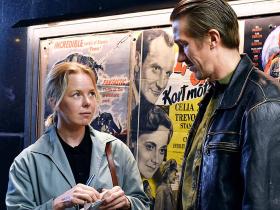 excellence. Its also a deadpan comedy, which despite it’s nearly tragic atmosphere, will have you laughing and crying all the way through. If you’ve ever seen an Aki Kaurismaki movie before you’ll instantly recognize his style: seedy bars, bearded bikers, dark rock n roll, and a noir-ish, retro feel. Similar to Jim Jarmusch, but much funnier. It also deals with real-life issues like alcoholism and poverty. Ansa loses her job for taking home an expired cookie instead of throwing it away, while Holappa is driven close to self- destruction by his constant boozing. If you haven’t seen his movies before, Fallen Leaves is a great one to start.
excellence. Its also a deadpan comedy, which despite it’s nearly tragic atmosphere, will have you laughing and crying all the way through. If you’ve ever seen an Aki Kaurismaki movie before you’ll instantly recognize his style: seedy bars, bearded bikers, dark rock n roll, and a noir-ish, retro feel. Similar to Jim Jarmusch, but much funnier. It also deals with real-life issues like alcoholism and poverty. Ansa loses her job for taking home an expired cookie instead of throwing it away, while Holappa is driven close to self- destruction by his constant boozing. If you haven’t seen his movies before, Fallen Leaves is a great one to start.
Everything in this film is retro. Finland is the high-tech home of Nokia and Supercell, but in Kaurismaki’s world the characters use avocado coloured landlines, with cel phones or video games  nowhere to be seen. Computers seem relegated to internet cafes. Phone numbers are written on slips of paper, blown away with the wind. Movie theatres only play classics, and every bar is on skid row.
nowhere to be seen. Computers seem relegated to internet cafes. Phone numbers are written on slips of paper, blown away with the wind. Movie theatres only play classics, and every bar is on skid row.
At the same time, there’s always a niceness and sweetness burbling just below the surface of the humdrum futility of everyday life. Fallen Leaves is a wonderfully depressing movie with a feel-good atmosphere. I love this movie.
Fallen Leaves and Orlando My Political Biography are both playing now at the TIFF Bell Lightbox, and at other theatres across Canada — check your local listings.
This is Daniel Garber at the Movies, each Saturday morning, on CIUT 89.5 FM and on my website culturalmining.com.
Fighting. Films reviewed: Seagrass, The Hunger Games: The Ballad of Songbirds and Snakes, Testament
Hi, this is Daniel Garber at the Movies for culturalmining.com and CIUT 89.5 FM.
 Fall Film Festival Season keeps on rolling. I had the pleasure of attending the opening-night screening of the ReelAsian film festival. It’s the delightful comedy/drama The Queen Of My Dreams, directed by Fawzia Mirza. It follows a queer Toronto woman in Karachi for a funeral as she recalls her own and her estranged mother’s) history in Pakistan in the 60s and Halifax in the 80s — all while listening and dancing to Bollywood songs. ReelAsian is in its 27th year showing films from across that continent and in the asian diaspora, now through November 19th. And the Shorts not Pants festival opens on November 17th. In case you’re wondering it’s not about cut-offs or basketball shorts — it’s a curated short film festival, which I’ve heard is quite good.
Fall Film Festival Season keeps on rolling. I had the pleasure of attending the opening-night screening of the ReelAsian film festival. It’s the delightful comedy/drama The Queen Of My Dreams, directed by Fawzia Mirza. It follows a queer Toronto woman in Karachi for a funeral as she recalls her own and her estranged mother’s) history in Pakistan in the 60s and Halifax in the 80s — all while listening and dancing to Bollywood songs. ReelAsian is in its 27th year showing films from across that continent and in the asian diaspora, now through November 19th. And the Shorts not Pants festival opens on November 17th. In case you’re wondering it’s not about cut-offs or basketball shorts — it’s a curated short film festival, which I’ve heard is quite good.
This week, I’m looking at three new movies — one of which is playing at ReelAsian. There’s a fight over a painting in Montreal, a fighting couple on an island near Nanaimo, and a fight to the death in the city of Panem.
 Seagrass
Seagrass
Wri/Dir: Meredith Hama-Brown
It’s the summer of 2011. Judith and Steve (Ally Maki, Luke Roberts) are riding a ferry with their kids to a rocky island near Nanaimo, BC. They’re renting a cabin complete with a kitchen, and there’s even a swimming pool with lots of games and hikes planned for all the kids there. It’s a shady forest that leads to a mysterious dark cave on the shore. The couple in the next cabin, Pat and Carol (Chris Pang and Sarah Gadon) — a white and asian pair like Judith and Steve — swear the last time they spent on the island was a life-changer. The thing is, they’re not there for a vacation. It’s a place where couples can look at their relationship and try to work out their differences through daily group therapy  sessions. The kids, Steph and Emmy (Nyha Huang Breitkreuz, Remy Marthaller) have problems of their own to work out. 10-year-old Steph doesn’t want to babysit her 6-year-old sister — she’d rather mess around with friends at get-togethers.
sessions. The kids, Steph and Emmy (Nyha Huang Breitkreuz, Remy Marthaller) have problems of their own to work out. 10-year-old Steph doesn’t want to babysit her 6-year-old sister — she’d rather mess around with friends at get-togethers.
The problem is Judith is depressed — she’s been that way since her mom died many months earlier. And now she’s regretting she never talked with her about the internment camps Japanese Canadians were put in during WWII. Or what happened to her dad’s fishing boat. It’s like there’s a ghost or spirit lurking above the family — is it the kids’ late grandmother or just the general bad feelings? It’s not just that, Judith isn’t sleeping with Steve anymore. And Steve is increasingly jealous and angry that Pat — the husband next-door — seems to be spending too much time with Judith. As the pressure builds it begins to affect the kids too, leading to a potentially frightening conclusion.
 Seagrass is a stunning look at secrets revealed at a getaway in British Columbia. It’s also about identity, history and family, especially of Japanese-Canadians. I found it very moving, a bit of a tear-jerker actually. At the same time, it makes you uneasy to watch the story unfold, and the unexpected revelations it leads to. It’s not your typical marriage counselling movie; it’s equally about the kids, and the subtle racism they face. The cast is uniformly great, but especially Ally Maki as a woman on the verge of a nervous breakdown. This movie also does amazing things both visually and audibly, from pop songs to eerie sound effects.
Seagrass is a stunning look at secrets revealed at a getaway in British Columbia. It’s also about identity, history and family, especially of Japanese-Canadians. I found it very moving, a bit of a tear-jerker actually. At the same time, it makes you uneasy to watch the story unfold, and the unexpected revelations it leads to. It’s not your typical marriage counselling movie; it’s equally about the kids, and the subtle racism they face. The cast is uniformly great, but especially Ally Maki as a woman on the verge of a nervous breakdown. This movie also does amazing things both visually and audibly, from pop songs to eerie sound effects.
Great movie.
 The Hunger Games: The Ballad of Songbirds and Snakes
The Hunger Games: The Ballad of Songbirds and Snakes
Dir: Francis Lawrence
Coriolanus Snow (Tom Blyth) is a young man with a keen intellect. He’s handsome, popular and ambitious. He lives in Panem, the capital city of a post-apocalyptic world. A top student at the Academy, the training grounds for the nation’s top leaders, he’s in line for the Plinth prize. He needs to win it because, although he’s from an aristocratic family, he’s poor. So poor, his cousin Tigris makes his shirt buttons out of bathroom tiles, and school lunches keep him alive.
But the scholarship is at risk when Dean Highbottom (Peter Dinklage) declares all students must participate in the Hunger Games as a mentor to a tribute, the kids sent to the capital from each outlying district. Lucy Gray (Rachel Zegler) from District 12 is his Tribute — if she wins the Hunger Games, Coriolanus gets the prize money. So he will do anything to keep her alive. She’s a pretty songbird — from a long line of travelling musicians — who dresses in colourful outfits. The two hit it off, and prove a formidable team of underdogs. Will they beat the odds, and survive? And is there relationship more than just a game?
The Hunger Games: The Ballad of Songbirds and Snakes is a gripping action-adventure movie based on the dystopian YA novels. I read avidly the trilogy when it first came out, but was less attached to the related movies — I only watched the first one, maybe because I knew what was going to happen. But this one took me by surprise; it’s a prequel, set half a century before the other books. So I found it exciting, dark and gripping. It is violent — after all, this game is about 24 kids murdering one another in a stadium. But this is set in the early years of the Hunger Games: the capital is battle-scarred and decrepit. Drones sent to the tributes are primitive and dangerous, as likely to kill a player as to send them food or  water. These hunger games are darker and grittier. I like the novelistic turns of plot, and the truly evil characters, especially Dr. Volumnia Gaul wonderfully played by Viola Davis as a mad scientist who creates terrifying animals — the snakes and birds of the title — to stymie the districts and their tributes. Zegler is good as Lucy, singing as much as she talks, and Blyth is great as the conflicted Corio. The explosions and pyrotechnics look fantastic on a big screen, so if you’re into this kind of movie, see it now, not on some future TV streamer.
water. These hunger games are darker and grittier. I like the novelistic turns of plot, and the truly evil characters, especially Dr. Volumnia Gaul wonderfully played by Viola Davis as a mad scientist who creates terrifying animals — the snakes and birds of the title — to stymie the districts and their tributes. Zegler is good as Lucy, singing as much as she talks, and Blyth is great as the conflicted Corio. The explosions and pyrotechnics look fantastic on a big screen, so if you’re into this kind of movie, see it now, not on some future TV streamer.
 Testament
Testament
Wri/Dir: Denys Arcand
Jean-Michel Bouchard (Rémy Girard) is a retired writer and archivist in Montreal. He still has an office but lives in a venerable, public retirement home. Never married, no kids, but he still has many friends to spend time with. Suzanne Francoeur (Sophie Lorain) is the directrice of the building, and keeps her eagle eye on anything that could disrupt her tightly-run edifice. But when a group of college protesters set up camp across the street chanting Free First Nations! she isn’t sure how to handle it. The anglophone demonstrators say the building is full of racist art.
The issue at hand? A 19th century fresco on a wall in the music room depicting Champlain’s first meeting with the Iroquois. The protesters say the French are settler-colonists in fancy dress while indigenous men are depicted as primitive barbarians, while the women are topless. Meanwhile, Jean- Michel’s close friend Roger, a fitness and health food nut, suddenly drops dead right in front of him. Jean- Michel receives a literary prize, but is mistaken for someone else with a similar name. And Suzanne seems to be standing just outside his door whenever a young woman visits him in his bedroom — why is she there? As the tension from the protesters grows, media, Quebec nationalists, bureaucrats and politicians all descend on the home. Can Jean-Michel stop the madness? Or is this the beginning of the end? And what will happen to the mural?
room depicting Champlain’s first meeting with the Iroquois. The protesters say the French are settler-colonists in fancy dress while indigenous men are depicted as primitive barbarians, while the women are topless. Meanwhile, Jean- Michel’s close friend Roger, a fitness and health food nut, suddenly drops dead right in front of him. Jean- Michel receives a literary prize, but is mistaken for someone else with a similar name. And Suzanne seems to be standing just outside his door whenever a young woman visits him in his bedroom — why is she there? As the tension from the protesters grows, media, Quebec nationalists, bureaucrats and politicians all descend on the home. Can Jean-Michel stop the madness? Or is this the beginning of the end? And what will happen to the mural?
Testament is a political and social satire about Quebec’s aging boomers, as their rule ends. Denys Arcand has been covering this cohort for four decades, in films like The Decline of the American Empire, The Barbarian Invasions, and The Fall of the American Empire. This one shares similar themes and some of the same actors as well. The characters are stereotypical and amusing — anglo protesters are buffoons, seniors are clueless busybodies, feminists snarl, while politicians tell baldfaced lies — but he pokes at the politics from all sides. It has a huge cast, including Robert Lepage (who had his own controversy involving indigenous issues) as an effete arts/politics leader in an hilarious parody of himself. There’s also a romantic subplot — no spoilers — and, surprisingly, some very moving moments.
If you want to understand Quebec cultural politics — with a lot of laughs — you must watch Denys Arcand’s Testament.
Seagrass is playing at the TIFF Bell Lightbox, one of many great films at the ReelAsian Film Festival. Testament and Hunger Games both open this weekend in Toronto; check your local listings.
This is Daniel Garber at the Movies, each Saturday morning, on CIUT 89.5 FM and on my website, culturalmining.com.
Urban chaos. Films reviewed: Crimes of the Future, The Divide
Hi, this is Daniel Garber at the Movies for culturalmining.com and CIUT 89.5 FM.
Spring film festival season continues in June, when the idea of sitting in an air-conditioned movie theatre starts sounding better and better. The Female Eye film fest is on next Thursday through Saturday at the TIFF Bell Lighbox, showing films by female directors. Look out for Go On and Bleed about an American draft-dodger in 1971 — it’s directed by J. Christian Hamilton, host of Dementia 13, playing psychedelic music at this station. And if you’re down California way, catch the 3rd Annual Blue Water Film Festival, celebrating the United Nations World Oceans Day, with movies about Antartica, whales, oceans.
But this week I’m looking at two new movies — both opening this weekend in Toronto — about urban chaos and society in decline. There’s a film from France about an artist and a protester seeking refuge in a hospital; and another one from Canada about an artist who treats radical surgery as performance.
Wri/Dir: David Cronenberg
Picture a future where you don’t just sit in a chair, it latches onto you with grotesque bone-like appendages. It’s a world that diverged away from ours in the 1980s or 90s. People still carry huge clunky portable phones, they keep files in filing cabinets, and everything’s analogue. But technology has taken an unexpected turn — humans have “evolved”… drastically so. Pain and pleasure sensations have mainly disappeared, so people seeking sexual fulfillment might slice pieces of flesh of their lovers’ bodies… and then snack on it in a non-lethal, cannibalistic orgy. Government has largely collapsed, and police operate undercover in cels of corruption.
In this future world, Saul Tenser (Viggo Mortensen) and Caprice (Lèa Seydoux) are a  celebrity couple known for their artistic performances. Fans flock to events where Caprice records Tenser cutting open his belly to excise fully-grown, tattooed organs from his body, organs that developed spontaneously. Afterwards they visit a clandestine quasi governmental office where two dry bureaucrats Timlin and Wippet (Kristen Stewart and Don McKellar) file their cases in the appropriate folders.
celebrity couple known for their artistic performances. Fans flock to events where Caprice records Tenser cutting open his belly to excise fully-grown, tattooed organs from his body, organs that developed spontaneously. Afterwards they visit a clandestine quasi governmental office where two dry bureaucrats Timlin and Wippet (Kristen Stewart and Don McKellar) file their cases in the appropriate folders.
But there are complications. An undercover cop wants Tenser to be his informant. A young father named Lang (Scott Speedman) is also seeking out Lang and Caprice. He recently lost his son when his ex-wife murdered the boy because she didn’t like the way the boy ate plastic trashcans. He’s also stalking Tenser; but why?
 Crimes of the Future is an extremely strange movie, maybe Cronenberg’s weirdest yet. Its full of sex, art and cringe-worthy gross-outs. Things like after Tenser gets a living-flesh zipper sewn into his belly, Caprice unzips it to performs oral sex on his gaping wound. It’s grotesque, but I’m not even revealing any of the most crucial horrific scenes. The costumes and special effects are terrific, and the locations (the movie was shot in Greece) are appropriately seedy and falling apart.
Crimes of the Future is an extremely strange movie, maybe Cronenberg’s weirdest yet. Its full of sex, art and cringe-worthy gross-outs. Things like after Tenser gets a living-flesh zipper sewn into his belly, Caprice unzips it to performs oral sex on his gaping wound. It’s grotesque, but I’m not even revealing any of the most crucial horrific scenes. The costumes and special effects are terrific, and the locations (the movie was shot in Greece) are appropriately seedy and falling apart.
Does any of this make sense? Well it does, kinda.
It fools around with our fear of Big Pharma and the physical changes it could make to our bodies. It also deftly satirizes the worlds of art, celebrity and government. There’s an otherworldly feel to the whole movie, the stuff of dreams (or nightmares). It’s slow moving and very creepy but this isn’t a screamer-type horror movie, more of a constant supply of shock and yuck. Viggo Mortensen acts like a vampire or an unwrapped mummy, always shrouded in hoods and shawls, while Lèa Seydoux as Caprice is equal parts model and body-modification fanatic. Do I like this movie? Not exactly, it creeps me out and occasionally slides into the ludicrous, but I’m glad I saw it — with some of its images permanently burned into my brain’s synapses.
Wri/Dir: Catherine Corsini
Raf (Valeria Bruni Tedeschi) is a middle-aged, middle-class liberal cartoonist in Paris. She’s also a neurotic, relentless nag, given to sending countless text messages at 3 am. The recipient of the texts is her lover Julie (Marina Foïs), an editor and publisher who shares her bed. They live together along with Julie’s teenaged son. And Julie has had it — she wants to break up. And despite Raf’s pleas, she refuses to budge. They take their fight onto the street, but when Julie stomps away in anger, Raf slips and falls, ending up in hospital. But this is no ordinary day.
It’’s 2019 in Paris, and France is angry. Macron’s corporate and wealth taxes cuts, are making people angry. So are his austerity measures, cutting unemployment insurance and the general social Gas prices are rising, and surveillance cameras are appearing on the 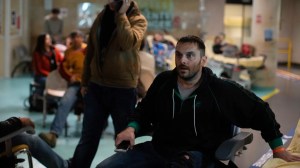 streets…So a huge coalition of truckers, precarious workers, and anarchists converge on the Champs Elysée to stop traffic and get noticed.
streets…So a huge coalition of truckers, precarious workers, and anarchists converge on the Champs Elysée to stop traffic and get noticed.
But the police crack down on the Yellow Vest protesters, sending dozens to hospital. So doctors and nurses are overworked and overwhelmed with patients. One is Yann (Pio Marmaï) a trucker in Paris just for the afternoon to check out the protests. He has shrapnel in his leg, and if he doesn’t get home by morning he’ll lose his job. Kim (Aïssatou Diallo Sagna) is a nurse in the hospital, dealing with the sudden influx of injured patients… and he own baby is not doing well. Meanwhile the police are trying to break in to arrest the injured protesters. And Raf and Julie’s teenaged son — who went to the demonstrations — is still missing. Can the chaos of the hospital bring these very different people together? Or is the divide too great?
 The Divide is a terrific, realistic day in the life of a group of Parisians stuck in a crisis. I like the French title, La Fracture better, because it’s about Raf’s broken arm, but also about the huge divisions in French society. In its really warm and quirky view of diametrically opposed people forced to confront one another and work together, it humanizes all sides of the conflict. And there were lots of revelations — the yellow vests protesters were not right-wing followers of Le Pen… but they were angry at Macron. And while all this is going on, the on again, off again relationship of Raf and Julie, is resolved, one way or another by the end. The direction, script and acting are all just fantastic — Aïssatou Diallo Sagna won a César for best supporting actress and the film won the “Queer Palm” award as well. And after I watched it I remembered I‘ve seen this director’s work before, back in 2015; Summertime (La Belle Saison) was one of my favourite films that year. Which made me realize that this was no fluke, Corsini is a genius. The Divide is a wonderful warm human drama.
The Divide is a terrific, realistic day in the life of a group of Parisians stuck in a crisis. I like the French title, La Fracture better, because it’s about Raf’s broken arm, but also about the huge divisions in French society. In its really warm and quirky view of diametrically opposed people forced to confront one another and work together, it humanizes all sides of the conflict. And there were lots of revelations — the yellow vests protesters were not right-wing followers of Le Pen… but they were angry at Macron. And while all this is going on, the on again, off again relationship of Raf and Julie, is resolved, one way or another by the end. The direction, script and acting are all just fantastic — Aïssatou Diallo Sagna won a César for best supporting actress and the film won the “Queer Palm” award as well. And after I watched it I remembered I‘ve seen this director’s work before, back in 2015; Summertime (La Belle Saison) was one of my favourite films that year. Which made me realize that this was no fluke, Corsini is a genius. The Divide is a wonderful warm human drama.
The Divide is playing at the Inside-Out film festival through Sunday; and Crimes of the Future opens this weekend in Toronto; check your local listings.
This is Daniel Garber at the Movies, each Saturday morning, on CIUT 89.5 FM and on my website, culturalmining.com
Hot Docs 22! Films reviewed: Hunting in Packs, Midwives PLUS other docs to look out for
Hi, this is Daniel Garber at the Movies for culturalmining.com and CIUT 89.5 FM.
Hotdocs, Canada’s International Documentary Festival is on now, showing more than 200 selected movies, many having their world premier. Filmmakers are now in Toronto from all around the world, and so are many of the films subjects. And as always daytime screenings are free for students and seniors: go to hotdocs.ca for details and restrictions.
 And — unlike with mainstream motion pictures — a large number of the directors are women. This year they’re featuring films by the legendary documentarians Janis Cole and Holly Dale, whose films P4W: Prison for Women and Hookers on Davie (about sex workers in Vancouver) are not to be missed. I saw both of these many years ago, and they’re unforgettable.
And — unlike with mainstream motion pictures — a large number of the directors are women. This year they’re featuring films by the legendary documentarians Janis Cole and Holly Dale, whose films P4W: Prison for Women and Hookers on Davie (about sex workers in Vancouver) are not to be missed. I saw both of these many years ago, and they’re unforgettable.
This week I’m looking at two more movies — both directed by and about women — playing at hotdocs. There are midwives in Myanmar and politicos in Parliaments and Congress.
But before that I’m talking about some of the movies playing at Hotdocs that I haven’t seen yet but look like they’re worth checking out
Movies at Hotdocs.
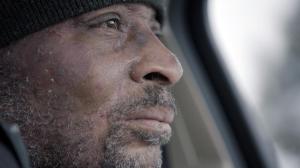 One is Jennifer Baichwal’s newest doc Into the Weeds. It’s about a groundskeeper who stood up to the agro-chemical giant Monsanto when he (and tens of thousands of others) got sick after using the herbicide Roundup. Baichwal has won numerous awards for her breathtakingly beautiful documentaries like Manufactured Landscapes and Anthropocene: The Human Epoch, so I’m sure this one is worth seeing too.
One is Jennifer Baichwal’s newest doc Into the Weeds. It’s about a groundskeeper who stood up to the agro-chemical giant Monsanto when he (and tens of thousands of others) got sick after using the herbicide Roundup. Baichwal has won numerous awards for her breathtakingly beautiful documentaries like Manufactured Landscapes and Anthropocene: The Human Epoch, so I’m sure this one is worth seeing too.
Reg Harkema has a new documentary all about the Kids in the Hall, the great Toronto comedy group. They’re getting back together, and three of them — Scott Thompson, Bruce McCulloch, and Mark McKinney — will be at Hotdocs premier in person. Can’t wait to see that.
Another celeb in town is Abigail Disney (of the Disney family) who is now a social activist and filmmaker,  She co-directed The American Dream and Other Fairy Tales, which talks about the great class divide and economic inequality in the US, using her own family as the starting point.
She co-directed The American Dream and Other Fairy Tales, which talks about the great class divide and economic inequality in the US, using her own family as the starting point.
Atomic Hope: Inside the Pro-Nuclear Movement talks with scientists campaigning for nuclear energy as an alternative to fossil fuels in slowing climate change. This sounds very interesting.
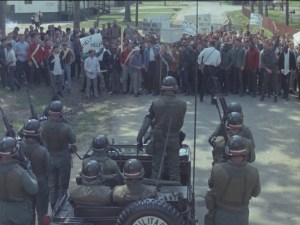 In the Eye of the Storm: The Political Odyssey of Yanis Varoufakis is about the former Finance Minister of Greece who fought against the brutal austerity measures imposed by European banks.
In the Eye of the Storm: The Political Odyssey of Yanis Varoufakis is about the former Finance Minister of Greece who fought against the brutal austerity measures imposed by European banks.
Riotsville, USA tells the true story of two fake towns built in the 1960s to train military troops to crack down on demonstrations and civil disobedience.
On a lighter note, Her Scents of Pu Er looks at the first female tea master in China’s history, who shares the secrets of that fragrant and much sought after tea. And Patty vs Patty tells the bizarre true story of Toronto city hall trying to force sellers of Jamaican beef patties to call them something else, because  they’re not hamburger patties. This actually happened.
they’re not hamburger patties. This actually happened.
All of these movies are playing at Hotdocs, right now.
Dir: Chloe Sosa-Sims
Michelle Rempel is a conservative MP from Calgary, who is an ardent supporter of building more pipelines and encouraging the fossil fuel industry. Jess Philips is an MP from Birmingham from the Labour Party. An ardent feminist, she opposes the leftist Jeremy Corbyn, veering toward Keir Starmer on the party’s centre-right. And Pramila Jayapal is a congresswoman from Seattle. Born in Chennai, India, she is a longtime advocate for immigrant rights and represents the progressive wing of the Democratic Party. So what do these three very different people have in common? They’re all outspoken politicians with firm beliefs… who are also women.
Democratic Party. So what do these three very different people have in common? They’re all outspoken politicians with firm beliefs… who are also women.
Hunting in Packs is a great, behind-the-scenes look at women in politics over the course of a few years, and the particular abuse they face, up to and including recent elections. It takes you to political “war rooms”, TV appearance, door-to-door canvassing, and the daily drudgery of a politician’s life. It shows them dealing with hecklers and potentially violent protesters (Jess Philips  brings up the terrible murder of another Labour MP, Jo Cox, by a politically motivated killer, just a few years ago.) It also reveals some hidden aspects of these women’s personalities. Rempel can curse a blue streak that would make a sailor blush. Philips keeps her cool passing in-your-face protesters. And Jayapal, while the most polished of the three, sticks to her guns and faces down abusive comments on the floor of the House. And regardless of your politics, the three women are each likeable in her own way. This is an entertaining look at the game of politics in the US, UK and Canada.
brings up the terrible murder of another Labour MP, Jo Cox, by a politically motivated killer, just a few years ago.) It also reveals some hidden aspects of these women’s personalities. Rempel can curse a blue streak that would make a sailor blush. Philips keeps her cool passing in-your-face protesters. And Jayapal, while the most polished of the three, sticks to her guns and faces down abusive comments on the floor of the House. And regardless of your politics, the three women are each likeable in her own way. This is an entertaining look at the game of politics in the US, UK and Canada.
Dir: Hnin Ei Hlaing (Snow)
Hla is an established midwife in Rakhine state in western Myanmar, where she functions as the local doctor, caring for women, not just when they’re giving birth. She notices that a lot of women in her village receive no medical care at all, with some forced to give birth, alone, in the middle of their fields. This is unheard of. So Hla decides to hire a young woman named Nyo Nyo as her apprentice so she can care for this underserved population.
Seems pretty straightforward, right?
No!
Rakhine is a deeply troubled area with rebels fighting the central government, as well as ethnic strife within. This is where a million Rohingya were forced to flee to squalid refugee camps across the border in Bangladesh following brutal violence, rape and arson directed against them. And what do we have here? Hla (Rakhine and Buddhist) hiring Nyo Nyo (Rohingya and  Muslim) as her apprentice. And nationalists, soldiers, and rebels are not happy about this. Can two very different women work together as midwives? Or will ethnic strife tear their arrangement apart?
Muslim) as her apprentice. And nationalists, soldiers, and rebels are not happy about this. Can two very different women work together as midwives? Or will ethnic strife tear their arrangement apart?
Midwives is a fascinating, observational-style documentary that gives us a glimpse of two women as out follows them over several years. It shows the raw and rough aspects of their lives — including an actual childbirth on camera — as Nyo Nyo gradually learns her profession. It also exposes the casual racism — 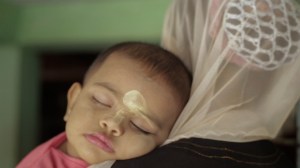 from rude, everyday comments about Nyo Nyo’s darker skin, to pop songs on the radio inciting violence against the Rohingya, that shapes the attitudes in that region. All this set against a tumultuous political climate, with a violent military that eventually overthrows the democratically elected government. It’s not unusual to hear missiles and bombs exploding outside the village. But it also gives us an intimate view of the two women and their families as they navigate their uncertain futures, through assimilation, learning languages, and opening a new business. You learn to love and laugh with these two unusual women. It gives an honest and realistic look at this troubled area, as rarely seen on film.
from rude, everyday comments about Nyo Nyo’s darker skin, to pop songs on the radio inciting violence against the Rohingya, that shapes the attitudes in that region. All this set against a tumultuous political climate, with a violent military that eventually overthrows the democratically elected government. It’s not unusual to hear missiles and bombs exploding outside the village. But it also gives us an intimate view of the two women and their families as they navigate their uncertain futures, through assimilation, learning languages, and opening a new business. You learn to love and laugh with these two unusual women. It gives an honest and realistic look at this troubled area, as rarely seen on film.
Midwives and Hunting in Packs are both premiering at hotdocs. Go to hotdocs.ca for tickets.
This is Daniel Garber at the Movies, each Saturday morning, on CIUT 89.5 FM and on my website, culturalmining.com.
Get away. Films reviewed: The Jump, See For Me
Hi, this is Daniel Garber at the Movies for culturalmining.com and CIUT 89.5 FM.
 Today is CIUT’s 35th anniversary and we plan to be around for at least 35 years more.
Today is CIUT’s 35th anniversary and we plan to be around for at least 35 years more.
This week I’m looking at two movies — one from Lithuania and one from Canada, now playing in virtual cinemas or Video on Demand. There’s a sailor who jumps off a ship to escape Soviet domination, and a blind cat-sitter who uses a phone app to escape from a gang of thieves.
But first, to celebrate CIUT’s 35th anniversary, here’s a clip of two of my earliest reviews, originally broadcast in January, 2010, where I talk about two films by Québec directors Xavier Dolan and Denis Villeneuve, early in their careers.
(listen)
And now back to the future in 2022!
Dir: Giedre Zickyte
It’s November, 1970. Simas Kudirka is a Lithunian sailor who is married with children. He works aboard a huge ship, the Sovetskaya Litva. Simas has been enchanted by the idea of going to sea since he was young man, picturing swaying palms and exotic tropical climes. Instead he ends up in the drab grey, north Atlantic. But his life turns upside down when the ship, seeking shelter from bad weather, anchors near Martha’s Vineyard, in Massachusetts. They are approached by the Vigilant, a US Coast Guard boat, and in a sudden, spontaneous decision, Simas jumps from the deck of his ship onto the Coast Guard boat. He says he’s defecting from the Soviet Union and seeking asylum in the US. But in a surprising decision, when KGB officers board the Vigilant, the Americans turn down his plea and hand him back. Remember this is during the cold war, when relations 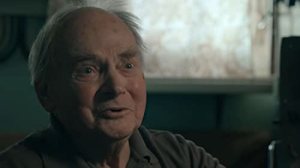 between the US and the USSR are tenuous at best, with both countries fighting proxy wars in countries around the world. And both have enough ready-to-launch nuclear weapons to destroy the world many times over.
between the US and the USSR are tenuous at best, with both countries fighting proxy wars in countries around the world. And both have enough ready-to-launch nuclear weapons to destroy the world many times over.
Simas is sentenced to prison for treason. But that’s not the end of the story. He becomes a political hot potato in the US, where widespread protests by Lithuanian Americans turn him into a cause celebre about the Baltic states. Will he be released from prison? And will he ever reach the United States?
The Jump is a Lithuanian documentary that revisits the case 50 years later. It incorporates contemporary news stories, footage  from a TV movie made about him (played by Alan Arkin) and new interviews with all the main people involved; from former KGB agents to Henry Kissinger, retired coast guard sailors, politicians and the American women who tirelessly worked toward his release. And of course, Simas Kudirka himself. The Jump is a fascinating story about how one man can lead to monumental changes. It doesn’t go deeply into political critiques; this is more of a personal story coloured with a nationalist point of view. But it’s a good story.
from a TV movie made about him (played by Alan Arkin) and new interviews with all the main people involved; from former KGB agents to Henry Kissinger, retired coast guard sailors, politicians and the American women who tirelessly worked toward his release. And of course, Simas Kudirka himself. The Jump is a fascinating story about how one man can lead to monumental changes. It doesn’t go deeply into political critiques; this is more of a personal story coloured with a nationalist point of view. But it’s a good story.
Dir: Randall Okita
Sophie (Skyler Davenport) was once a young, competitive alpine skier with Olympic ambitions. But her athletic career was cut short when she lost her vision. Now she now lives with her mother and earns a meagre living as a cat-sitter. She’s angry and frustrated. But she takes a job in a remote glass and wooden house deep in a forest. It’s luxurious and well paying, because the recently-divorced owner is heading abroad on vacation. It’s also her first time using a new app on her phone her overprotective mom gave her. It’s called See for Me, and it hooks up visually-impaired people with random helpers around the world. The user holds up the phone and the helper tells her which way to turn, where to pickup a lost item, or read directions on a table. And when Sophie finds herself locked out and alone on a cold winter’s day, it proves invaluable.
The helper, Kelly (Jessica Parker Kennedy) is a former marine  and video game enthusiast. She teaches Sophie how to break in through a sliding door. But that’s small potatoes compared with what happens that evening. She awakens to strange voices in the house. They’re professional thieves trying to break into a safe, in a building they assumed would be empty. And it turns out they’re armed and dangerous. And escape is impossible — there’s nowhere to go in the middle of a snowy forest. It’s up to Kelly to to help Sophie navigate her way around the house away from danger. But can a far-off ex-marine help a blind woman shoot to kill?
and video game enthusiast. She teaches Sophie how to break in through a sliding door. But that’s small potatoes compared with what happens that evening. She awakens to strange voices in the house. They’re professional thieves trying to break into a safe, in a building they assumed would be empty. And it turns out they’re armed and dangerous. And escape is impossible — there’s nowhere to go in the middle of a snowy forest. It’s up to Kelly to to help Sophie navigate her way around the house away from danger. But can a far-off ex-marine help a blind woman shoot to kill?
 See for Me is a good Canadian thriller about a seemingly helpless woman in a battle with nefarious criminals. It has a fair level of tension with a few unexpected twists. And the two main characters — Sophie and Kelly, played by Davenport and Kenedy — are great. My biggest problem with it is, it reduces much of the conflict down to a series of shootouts like in an old western. Guns to the rescue! Even a blind woman (gasp!) can kill mean men as long as she has a handgun. Kelly seems really eager to kill people, even by proxy, and Sophie is less than blameless herself (no spoilers). Still, if you’re itching to see a wintertime, cabin-in-the-woods thriller, this one’s not bad.
See for Me is a good Canadian thriller about a seemingly helpless woman in a battle with nefarious criminals. It has a fair level of tension with a few unexpected twists. And the two main characters — Sophie and Kelly, played by Davenport and Kenedy — are great. My biggest problem with it is, it reduces much of the conflict down to a series of shootouts like in an old western. Guns to the rescue! Even a blind woman (gasp!) can kill mean men as long as she has a handgun. Kelly seems really eager to kill people, even by proxy, and Sophie is less than blameless herself (no spoilers). Still, if you’re itching to see a wintertime, cabin-in-the-woods thriller, this one’s not bad.
See For Me is now available on VOD, and The Jump opens this weekend in virtual cinemas in cities like Sudbury, Montreal, and London — check your local listings.
This is Daniel Garber at the Movies, each Saturday morning, on CIUT 89.5 FM and on my website, culturalmining.com
Daniel Garber talks with Tracey Deer about Beans
 Hi, this is Daniel Garber at the Movies for culturalmining.com and CIUT 89.5 FM.
Hi, this is Daniel Garber at the Movies for culturalmining.com and CIUT 89.5 FM.
It’s the summer of 1990.
Tekehentahkhwa or “Beans” for short (Kiawentiio) is a typical,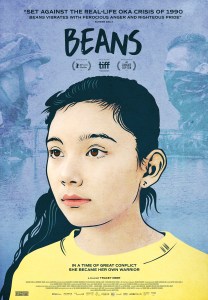 innocent 12-year-old girl who lives near Montréal with her Dad, her ambitious mom, and her little sister. Her biggest worry is getting into a posh private school to guarantee a successful future. But her life is totally changed when the town of Oka tries to grab Mohawk burial grounds to expand a golf course. Protests erupt and her family, being Mohawk, joins in. But when it turns into a blockade and a stand off involving police and the military, it reveals acts of violence and virulent racism she has never witnessed before. Now she has to make a decision: should she
innocent 12-year-old girl who lives near Montréal with her Dad, her ambitious mom, and her little sister. Her biggest worry is getting into a posh private school to guarantee a successful future. But her life is totally changed when the town of Oka tries to grab Mohawk burial grounds to expand a golf course. Protests erupt and her family, being Mohawk, joins in. But when it turns into a blockade and a stand off involving police and the military, it reveals acts of violence and virulent racism she has never witnessed before. Now she has to make a decision: should she 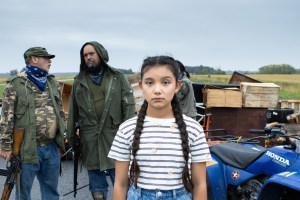 toughen up like her dad? Or keep to the straight and narrow like her mom? And how will she emerge from these life-shattering events?
toughen up like her dad? Or keep to the straight and narrow like her mom? And how will she emerge from these life-shattering events?
Beans is a fantastic new drama – told from an indigenous point of view – that combines the historical record with a highly personal and intimate coming-of-age story. Since it premiered at TIFF last fall, it has garnered dozens of awards for filmmaker, Tracey Deer who has created a work of personal and national importance.
I spoke with Tracey Deer via Zoom.
Beans is now playing in Toronto and all across Canada, from Victoria to Halifax.
 El Equipo
El Equipo Praying for Armageddon
Praying for Armageddon The Stroll
The Stroll Twice Colonized
Twice Colonized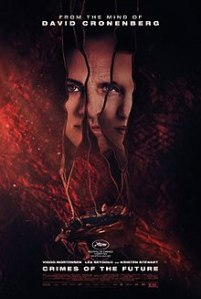

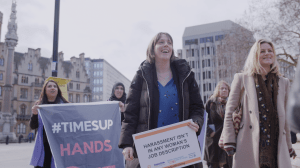

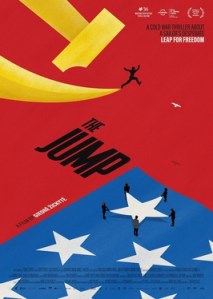



leave a comment